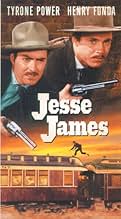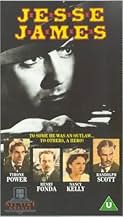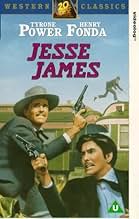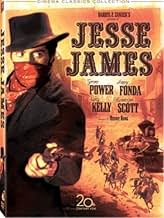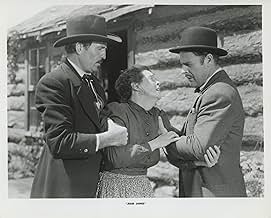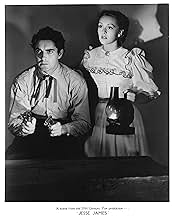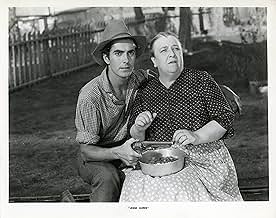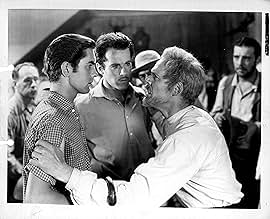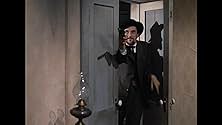AVALIAÇÃO DA IMDb
7,0/10
5,2 mil
SUA AVALIAÇÃO
Adicionar um enredo no seu idiomaAfter railroad agents forcibly evict the James family from their family farm, Jesse and Frank turn to banditry for revenge.After railroad agents forcibly evict the James family from their family farm, Jesse and Frank turn to banditry for revenge.After railroad agents forcibly evict the James family from their family farm, Jesse and Frank turn to banditry for revenge.
- Direção
- Roteiristas
- Artistas
Johnny Russell
- Jesse James Jr.
- (as John Russell)
Avaliações em destaque
The first western shot in color focuses more on mythology than facts of this famous outlaw. Tyrone Power in the lead role shows acting abilities not seen in his previous movies,and delivers an intense portrayal of Jesse James. Underplaying his part as Frank James to great effect, Henry Fonda steals the movie.Although a supporting part he's missed in the scenes his not in. Randolph Scott as the marshal delivers one of his best performances. Nancy Kelly makes a beautiful love interest for Power. Henry Hull's crusading editor is fun to watch. The movie is wonderful to look at and one of the great westerns.I hope this classic western will be out on DVD soon.
A real life legend of the Old West comes to life in this 1939 film, which may not be historically accurate or honest enough for purists, but nevertheless tells a good story while leaving any moral judgments up to the audience. `Jesse James,' directed by Henry King, stars Tyrone Power as the man heralded by some as the Robin Hood of cowboys. Whether or not he was actually a hero is debatable, and what this movie does is supply the motivation for the wrong-doing on Jesse's part-- at least up to a point. At the time this film was made, it was necessary for the filmmaker to present a story like this in a way that reflected a reckoning of sorts for a character engaged in any form of moral turpitude; and this film is no exception. But in this case, it's done with subtlety, and in a way that still allows the viewer's sympathies to be with the protagonist, regardless of his crimes.
At the heart of the matter is basically another version of the oft-told David and Goliath tale. In this story, Goliath is the railroad, expanding ever-westward and growing bigger and stronger by the day. When they encounter the farm on which Jesse, his brother, Frank (Henry Fonda) and their mother (Jane Darwell) reside and make their living, the railroad does what any self-respecting conglomerate would do-- they take it, pay the owners a pittance and lay their rail without giving it another thought. Only this time, the railroad messed with the wrong people. Not one to take it lying down, Jesse forms a gang-- which includes Frank-- and strikes back in the only way he knows how: By robbing the trains. And, just as Bonnie and Clyde would become, in a sense, local heroes a few years later, many began looking up to James as something of a redeemer; the man who stood up for all the others who were either unwilling or unable to do it for themselves after being wronged, as well, by the ruthless machinery of progress.
Power gives an outstanding performance as Jesse James, to whom he brings an intensity that seethes beneath his rugged good looks and determined attitude. Like Beatty did with Clyde, Power makes Jesse an outlaw you can't help but like, and actually admire. Because the James Power presents is nothing more nor less than a good man seeking reparation for the injury visited not only upon himself, but upon his family, to whom he feels justice is now due. It's a very credible and believable portrayal, though under close scrutiny his Jesse may come across as somewhat idealistically unflawed. Then again, within the time frame of this story, we are seeing a man adamant and single-minded of purpose, and the depth Power brings to the character more than accounts for what may be construed as a flawless nature.
As Frank James, Henry Fonda presents a man perhaps more laid-back than his brother, but every bit as volatile and adamant in his quest for justice. There's a coolness in his eyes and in his manner that belies the tenacity of his character. Fonda conveys the sense that Frank is a lion; he's no trouble without provocation, but once aroused he will demand satisfaction and stay with the scent until he has it. And it's that sense of dogged determination that Fonda and Power bring to their respective characters that makes them so engaging and accessible. Goliath is the real bad guy here, and you want to see him fall; and these are the guys you want to see bring him down.
In a supporting role, John Carradine gives a noteworthy performance as Jesse's own personal Judas, Bob Ford, a man who made history by demonstrating that there is, indeed, no honor among thieves. Carradine brings Ford to life in a sly and sinister way that leaves no doubt as to who the real villain of the story is.
The supporting cast includes Nancy Kelly (Zee), Randolph Scott (Will), Slim Summerville (Jailer), Brian Donlevy (Barshee), Donald Meek (McCoy), Charles Tannen (Charlie Ford), Claire Du Brey (Mrs. Ford) and Henry Hull, in an energetic and memorable performance as Major Rufus Cobb. Compared to many of the westerns made in the past couple of decades or so, this film is rather antiseptic in it's presentation; that is to say it lacks the graphic visuals of say, `The Wild Bunch' or Eastwood's `Unforgiven.' But `Jesse James' is satisfying entertainment that doesn't require or rely upon shocking realism to tell the story, but rather the talent and finesse of a great cast and a savvy director. It's a movie that will keep you involved, and Power and Fonda make it an especially enriching cinematic experience. In a very classic sense, this is the magic of the movies. I rate this one 8/10.
At the heart of the matter is basically another version of the oft-told David and Goliath tale. In this story, Goliath is the railroad, expanding ever-westward and growing bigger and stronger by the day. When they encounter the farm on which Jesse, his brother, Frank (Henry Fonda) and their mother (Jane Darwell) reside and make their living, the railroad does what any self-respecting conglomerate would do-- they take it, pay the owners a pittance and lay their rail without giving it another thought. Only this time, the railroad messed with the wrong people. Not one to take it lying down, Jesse forms a gang-- which includes Frank-- and strikes back in the only way he knows how: By robbing the trains. And, just as Bonnie and Clyde would become, in a sense, local heroes a few years later, many began looking up to James as something of a redeemer; the man who stood up for all the others who were either unwilling or unable to do it for themselves after being wronged, as well, by the ruthless machinery of progress.
Power gives an outstanding performance as Jesse James, to whom he brings an intensity that seethes beneath his rugged good looks and determined attitude. Like Beatty did with Clyde, Power makes Jesse an outlaw you can't help but like, and actually admire. Because the James Power presents is nothing more nor less than a good man seeking reparation for the injury visited not only upon himself, but upon his family, to whom he feels justice is now due. It's a very credible and believable portrayal, though under close scrutiny his Jesse may come across as somewhat idealistically unflawed. Then again, within the time frame of this story, we are seeing a man adamant and single-minded of purpose, and the depth Power brings to the character more than accounts for what may be construed as a flawless nature.
As Frank James, Henry Fonda presents a man perhaps more laid-back than his brother, but every bit as volatile and adamant in his quest for justice. There's a coolness in his eyes and in his manner that belies the tenacity of his character. Fonda conveys the sense that Frank is a lion; he's no trouble without provocation, but once aroused he will demand satisfaction and stay with the scent until he has it. And it's that sense of dogged determination that Fonda and Power bring to their respective characters that makes them so engaging and accessible. Goliath is the real bad guy here, and you want to see him fall; and these are the guys you want to see bring him down.
In a supporting role, John Carradine gives a noteworthy performance as Jesse's own personal Judas, Bob Ford, a man who made history by demonstrating that there is, indeed, no honor among thieves. Carradine brings Ford to life in a sly and sinister way that leaves no doubt as to who the real villain of the story is.
The supporting cast includes Nancy Kelly (Zee), Randolph Scott (Will), Slim Summerville (Jailer), Brian Donlevy (Barshee), Donald Meek (McCoy), Charles Tannen (Charlie Ford), Claire Du Brey (Mrs. Ford) and Henry Hull, in an energetic and memorable performance as Major Rufus Cobb. Compared to many of the westerns made in the past couple of decades or so, this film is rather antiseptic in it's presentation; that is to say it lacks the graphic visuals of say, `The Wild Bunch' or Eastwood's `Unforgiven.' But `Jesse James' is satisfying entertainment that doesn't require or rely upon shocking realism to tell the story, but rather the talent and finesse of a great cast and a savvy director. It's a movie that will keep you involved, and Power and Fonda make it an especially enriching cinematic experience. In a very classic sense, this is the magic of the movies. I rate this one 8/10.
Splendid in his first Western and his first Technicolor movie, Power portrayed Jesse James as a sympathetic hero and the most charming bank robber of the Old West
Teamed with Henry Fonda, and stalwart Randolph Scott, Henry King came with a Western classic, considered as one the best Jesse James of the series
The film opens in Pineville with hothead Jesse and temperate Frank as a couple of Missouri brothers who, embittered by the ruthless tactics of a railroad agent, got a warrant and had to skip out, hiding out until Major Rufus Cobb (Henry Hull) can get the governor to give them a fair trial But the railroad's got too much at stake to let two farmer boys bollix things up
After they had thrown Barshee (Brian Donlevy), the brutal railroad representative off the farm of their widowed mother (Jane Darwell) when she refused to sign over her property, Jesse and Frank later learn that she had been killed by a bomb tossed into their home by Barshee himself Jesse returns, shoots Barshee, and vows revenge on the railroad, with the complete sympathy of the Missouri populace
Jesse's sweetheart, Zee and her uncle, publisher Major Rufus, are among the James' supporters, as is U. S. Marshal Will Wright (Scott), but he has a job to do and is forced to track down the two brothers
Jesse and Frank have expanded their operation from merely harassing the St. Louis Midland with a series of holdups to robbing banks
Pursuaded by railroad president McCoy (Donald Meek) to talk Jesse into surrendering, Wright extracts a written promise of a light sentence for the desperado Zee then urges Jesse to give himself up following their wedding
Of course, Henry King tries to show how Jesse hated the railroads and from that hate he presented a charismatic hero But this hero was not going to last The more luck he had, the worse he gets It'll be his appetite for shooting and robbing until something happens to him
He also shows a worried fiancée keeping thinking of an outlaw all the time out there in the hills just going on and on to nowhere just trying to keep alive with everybody after him, wanting to kill him to get that money
There's a scene near the end where Zee (Nancy Kelly) after delivering her baby is lying in bed with her creature, with the presence of the Marshal, so to speak, between herself and her uncle that suddenly made clear to me what the entire film was about Her feelings as a woman: "I'm so tired to care. This is the way it always is. We live like animals, scared animals. We move. We hide. We don't dare to go out "
Obviously she is a sensitive woman who exposes her being on screen without losing sight of reality That's quite a great scene from King, and key in this great Western, as it's really all about her character, Zee Cobb, a struggling woman in love now a mother with a baby to take care of
So please don't miss it!
Teamed with Henry Fonda, and stalwart Randolph Scott, Henry King came with a Western classic, considered as one the best Jesse James of the series
The film opens in Pineville with hothead Jesse and temperate Frank as a couple of Missouri brothers who, embittered by the ruthless tactics of a railroad agent, got a warrant and had to skip out, hiding out until Major Rufus Cobb (Henry Hull) can get the governor to give them a fair trial But the railroad's got too much at stake to let two farmer boys bollix things up
After they had thrown Barshee (Brian Donlevy), the brutal railroad representative off the farm of their widowed mother (Jane Darwell) when she refused to sign over her property, Jesse and Frank later learn that she had been killed by a bomb tossed into their home by Barshee himself Jesse returns, shoots Barshee, and vows revenge on the railroad, with the complete sympathy of the Missouri populace
Jesse's sweetheart, Zee and her uncle, publisher Major Rufus, are among the James' supporters, as is U. S. Marshal Will Wright (Scott), but he has a job to do and is forced to track down the two brothers
Jesse and Frank have expanded their operation from merely harassing the St. Louis Midland with a series of holdups to robbing banks
Pursuaded by railroad president McCoy (Donald Meek) to talk Jesse into surrendering, Wright extracts a written promise of a light sentence for the desperado Zee then urges Jesse to give himself up following their wedding
Of course, Henry King tries to show how Jesse hated the railroads and from that hate he presented a charismatic hero But this hero was not going to last The more luck he had, the worse he gets It'll be his appetite for shooting and robbing until something happens to him
He also shows a worried fiancée keeping thinking of an outlaw all the time out there in the hills just going on and on to nowhere just trying to keep alive with everybody after him, wanting to kill him to get that money
There's a scene near the end where Zee (Nancy Kelly) after delivering her baby is lying in bed with her creature, with the presence of the Marshal, so to speak, between herself and her uncle that suddenly made clear to me what the entire film was about Her feelings as a woman: "I'm so tired to care. This is the way it always is. We live like animals, scared animals. We move. We hide. We don't dare to go out "
Obviously she is a sensitive woman who exposes her being on screen without losing sight of reality That's quite a great scene from King, and key in this great Western, as it's really all about her character, Zee Cobb, a struggling woman in love now a mother with a baby to take care of
So please don't miss it!
We are at the time of the Iron Horse birth, the railroads are buying out the farm land at ridiculously low prices, even resorting to bully tactics to get the signature rights. When one particularly nasty railroad agent tries his strong arm tactics on the mother of the James brothers, he gets more than he bargained for. In an act of almost vengeful negligence, the agent causes the death of Mrs James and thus sets the wheels in motion for what was to become folklore notoriety, Jesse James, his brother Frank, and a gang of seemingly loyal thieves, went on to etch their names in outlaw history.
There is no getting away from the fact that history tells us that this is a highly fictionalised account of Jesse James and his exploits. What we are given here by director Henry King and his screenwriter Nunally Johnson, is a more romanticised look at the legend of the man himself; which sure as heck fire makes for one dandy and enjoyable watch. The cast is one to savour, Tyrone Power (Jesse James), Henry Fonda (Frank James), Randolph Scott (Will Wright), Brian Donlevy (Barshee) and John Carradine (Bob Ford) all line up to entertain the masses with fine results, with Fonda possibly owing his subsequent career to his appearance here. He would return a year later in the successful sequel The Return Of Frank James and subsequently go on to greater and more rewarding projects. Power of course would go on and pick up the trusty blade and start swishing away, a career beckoned for this matinée idol for sure, but it's nice to revisit this particular picture to see that Power could indeed be an actor of note, capable of some emotional depth instead of making Jesse just another outlawish thug. If the makers have made the character too "heroic" then that's for debate, it's one of the many historical "itches" that have irked historians over the years. But Power plays it as such and it works very well.
One of the film's main strengths is the pairing of Power and Fonda, very believable as a kinship united in ideals, with both men expertly handled by the reliable Henry King. The Technicolor from Howard Greene and George Barnes is wonderfully put to good use here, splendidly capturing the essence of the time with eye catching results. While the film itself has a fine action quota, gun play and galloping horses all feature throughout, and the characterisations of the main players lend themselves to pulse raising sequences. To leave us with what? A highly accomplished Western picture that ends in the way that history has showed it should, whilst the rest of the film is flimsy history at best... Yes. But ultimately it really doesn't matter if one is after some Western entertainment, because for sure this picture scores high in that regard. 8/10
There is no getting away from the fact that history tells us that this is a highly fictionalised account of Jesse James and his exploits. What we are given here by director Henry King and his screenwriter Nunally Johnson, is a more romanticised look at the legend of the man himself; which sure as heck fire makes for one dandy and enjoyable watch. The cast is one to savour, Tyrone Power (Jesse James), Henry Fonda (Frank James), Randolph Scott (Will Wright), Brian Donlevy (Barshee) and John Carradine (Bob Ford) all line up to entertain the masses with fine results, with Fonda possibly owing his subsequent career to his appearance here. He would return a year later in the successful sequel The Return Of Frank James and subsequently go on to greater and more rewarding projects. Power of course would go on and pick up the trusty blade and start swishing away, a career beckoned for this matinée idol for sure, but it's nice to revisit this particular picture to see that Power could indeed be an actor of note, capable of some emotional depth instead of making Jesse just another outlawish thug. If the makers have made the character too "heroic" then that's for debate, it's one of the many historical "itches" that have irked historians over the years. But Power plays it as such and it works very well.
One of the film's main strengths is the pairing of Power and Fonda, very believable as a kinship united in ideals, with both men expertly handled by the reliable Henry King. The Technicolor from Howard Greene and George Barnes is wonderfully put to good use here, splendidly capturing the essence of the time with eye catching results. While the film itself has a fine action quota, gun play and galloping horses all feature throughout, and the characterisations of the main players lend themselves to pulse raising sequences. To leave us with what? A highly accomplished Western picture that ends in the way that history has showed it should, whilst the rest of the film is flimsy history at best... Yes. But ultimately it really doesn't matter if one is after some Western entertainment, because for sure this picture scores high in that regard. 8/10
With Ty Power and Hank Fonda in the saddle, there was no way this version of the James Brothers legend was going to paint them as bad guys.
Less so since the courtly southerner Nunnally Johnson wrote and produced the yarn. In reality the James boys took to knocking off banks and trains after being at a loose end following Missouri's joining the losing side in the War Between the States. This was too painful a scab to pick in the Thirties, so Johnson gives the Jameses a more palatable enemy than Abe Lincoln: big bad railroad barons upsetting their ma. And he paints his outlaws with a populist tint, to please New Deal Democrats as well as Dixiecrats who knew the real backstory.
However, the broad outlines of their rise and fall are intact. We see a gradual slide into semi-chivalrous villainy (they didn't rob train passengers, only mails), a 'Liberty Valance'-like exploitation of their coups by political orators and editors, Jesse's becoming consumed by his own legend, and the final botched bank job at Northfield, Minnesota. That leads to a panicky flight and an attempt to live semi-respectably under pseudonyms, followed by Bob Ford's betrayal as Jesse turns art curator.
The film is pleasingly quiet between action set pieces, free of the obtrusive music that was often the curse of Hollywood soundtracks and laced with good lines from Johnson's florid pen. And above all, surrounded by good character actors, we have two rising Zanuck stars tussling enjoyably for mastery, both in the plot and career-wise.
Henry King had become Power's preferred handler ('In Old Chicago' the previous year had been a wow) and both men evidently relish the challenge of tweaking his 'nice bank teller' image a little. Swarthy and bearded betimes, barking out orders to older subordinates, Power does fine. Fonda's grand remonstrance, when he tells Junior that he's turning into a suicidal psycho, is ably played and paced. The soft early tripack Technicolor looks sweet both outdoors-- Ford was getting similar results in 'Drums Along the Mohawk'-- and in candle-lit interiors.
Also noteworthy is Jesse's respectful, confiding relationship with his black ex-slave Pinky (Ernest Whitman) when he decides not to pursue Frank. Black maids could sass their mistresses in crazy comedies, but this quality of understanding between men of different colours was unusual in early-talkie Hollywood.
'Jesse James' was released in Hollywood's peak year, 1939. It's understandable that it was overlooked. But when we've done finger-wagging at the cruelty to horses which led the American Humane Association to demand supervisory privileges over stampedes-- and the cruelty to female Central Casting members which allowed Power to father a child on one-- we can still appreciate a good, workmanlike travesty of outlaw history. As a distortion of the James-Younger saga it has not been surpassed.
Less so since the courtly southerner Nunnally Johnson wrote and produced the yarn. In reality the James boys took to knocking off banks and trains after being at a loose end following Missouri's joining the losing side in the War Between the States. This was too painful a scab to pick in the Thirties, so Johnson gives the Jameses a more palatable enemy than Abe Lincoln: big bad railroad barons upsetting their ma. And he paints his outlaws with a populist tint, to please New Deal Democrats as well as Dixiecrats who knew the real backstory.
However, the broad outlines of their rise and fall are intact. We see a gradual slide into semi-chivalrous villainy (they didn't rob train passengers, only mails), a 'Liberty Valance'-like exploitation of their coups by political orators and editors, Jesse's becoming consumed by his own legend, and the final botched bank job at Northfield, Minnesota. That leads to a panicky flight and an attempt to live semi-respectably under pseudonyms, followed by Bob Ford's betrayal as Jesse turns art curator.
The film is pleasingly quiet between action set pieces, free of the obtrusive music that was often the curse of Hollywood soundtracks and laced with good lines from Johnson's florid pen. And above all, surrounded by good character actors, we have two rising Zanuck stars tussling enjoyably for mastery, both in the plot and career-wise.
Henry King had become Power's preferred handler ('In Old Chicago' the previous year had been a wow) and both men evidently relish the challenge of tweaking his 'nice bank teller' image a little. Swarthy and bearded betimes, barking out orders to older subordinates, Power does fine. Fonda's grand remonstrance, when he tells Junior that he's turning into a suicidal psycho, is ably played and paced. The soft early tripack Technicolor looks sweet both outdoors-- Ford was getting similar results in 'Drums Along the Mohawk'-- and in candle-lit interiors.
Also noteworthy is Jesse's respectful, confiding relationship with his black ex-slave Pinky (Ernest Whitman) when he decides not to pursue Frank. Black maids could sass their mistresses in crazy comedies, but this quality of understanding between men of different colours was unusual in early-talkie Hollywood.
'Jesse James' was released in Hollywood's peak year, 1939. It's understandable that it was overlooked. But when we've done finger-wagging at the cruelty to horses which led the American Humane Association to demand supervisory privileges over stampedes-- and the cruelty to female Central Casting members which allowed Power to father a child on one-- we can still appreciate a good, workmanlike travesty of outlaw history. As a distortion of the James-Younger saga it has not been surpassed.
Você sabia?
- CuriosidadesAfter the two horses that were blindfolded and forced to go over a cliff were killed, a new rule was enforced and later endorsed by The Humane Society of America in which strict standards were created to protect animals. Productions that met the standards of the Humane Society were allowed to add "No Animals Were Harmed or Injured in the Production of this Film" to the end credits. Eventually all the studios agreed that films involving any animals must have present a representative of The Humane Society to ensure that all animals are treated humanely and given a safe environment in which to work.
- Erros de gravaçãoThe movie shows a bomb killing Frank and Jesse's mother. In reality, the bomb thrown through the window by the Pinkerton agents killed their little brother and seriously wounded their mother, who survived although she lost an arm in the explosion.
- Citações
[last lines]
[about Jesse James]
Major Rufus Cobb: He was one of the doggonedest, gawl-dingedest, dad-blamedest buckaroos that ever rode across these United States of America!
- Cenas durante ou pós-créditosOpening credits prologue: After the tragic war between the states, America turned to the winning of the West. The symbol of this era was the building of the trans-continental railroads.
The advance of the railroads was, in some cases, predatory and unscrupulous. Whole communities found themselves victimized by an ever-growing ogre - the Iron Horse.
It was this uncertain and lawless age that gave to the world, for good or ill, its most famous outlaws, the brothers Frank and Jesse James.
- Versões alternativasAll UK versions were cut by 13 secs by the BBFC to remove footage of horse-falls including the controversial scene of a horse fatally falling from a cliff.
- ConexõesEdited into Homem e Mulher Até Certo Ponto (1970)
- Trilhas sonorasThe Battle Cry of Freedom
(1862) (uncredited)
Written by George Frederick Root
Played by the band at the railroad station
Principais escolhas
Faça login para avaliar e ver a lista de recomendações personalizadas
- How long is Jesse James?Fornecido pela Alexa
Detalhes
- Data de lançamento
- País de origem
- Idioma
- Também conhecido como
- Jesse James - Lenda de uma Era Sem Lei
- Locações de filme
- Empresa de produção
- Consulte mais créditos da empresa na IMDbPro
Bilheteria
- Orçamento
- US$ 1.600.000 (estimativa)
- Faturamento bruto mundial
- US$ 3.444
- Tempo de duração
- 1 h 46 min(106 min)
- Cor
- Proporção
- 1.37 : 1
Contribua para esta página
Sugerir uma alteração ou adicionar conteúdo ausente



